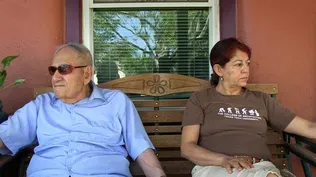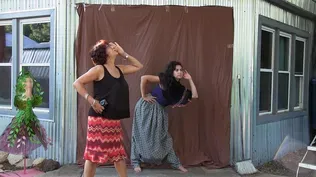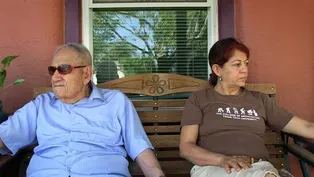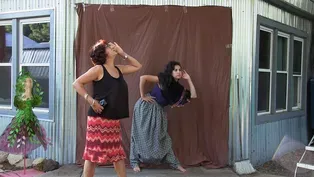
Jaddoland
Season 8 Episode 2 | 51m 33sVideo has Closed Captions
An intimate portrait of the work and process of visual artist, and immigrant, Lahib Jaddo.
JADDOLAND is an intimate portrait of the work and process of visual artist Lahib Jaddo while offering a fresh look at the immigrant story in America. Through an exploration of Jaddo's art and connections to her life in Texas, the film also drafts a unique picture of how art can help both the creator and the audience make sense of familial and cultural connections, loss, perseverance and life.
Major funding provided by the Corporation for Public Broadcasting and the John D. and Catherine T. MacArthur Foundation. Additional funding provided by the Wyncote Foundation, the National Endowment for the...

Jaddoland
Season 8 Episode 2 | 51m 33sVideo has Closed Captions
JADDOLAND is an intimate portrait of the work and process of visual artist Lahib Jaddo while offering a fresh look at the immigrant story in America. Through an exploration of Jaddo's art and connections to her life in Texas, the film also drafts a unique picture of how art can help both the creator and the audience make sense of familial and cultural connections, loss, perseverance and life.
How to Watch America ReFramed
America ReFramed is available to stream on pbs.org and the free PBS App, available on iPhone, Apple TV, Android TV, Android smartphones, Amazon Fire TV, Amazon Fire Tablet, Roku, Samsung Smart TV, and Vizio.
Providing Support for PBS.org
Learn Moreabout PBS online sponsorshipPart of These Collections

Asian American Pacific Islander Stories
Sharing the voices of the many in the Asian American Pacific Islander community.
View CollectionProviding Support for PBS.org
Learn Moreabout PBS online sponsorshipNATASHA DEL TORO: From Baghdad to West Texas, an intergenerational portrait.
LAHIB: You know, we were thinking that we could cope with whatever came our way.
I mean, we had been through a war already.
DEL TORO: The intimate story of a filmmaker, her artist mother, and their family's search for belonging.
LAHIB: I don't make art to make pretty things.
I make it because it helps me understand my life.
DEL TORO: "Jaddoland," on America ReFramed.
♪ MAN: It's beautiful.
(birds chirping) I'll give you a hint.
It's to the far left.
LAHIB: Ah.
MAN: Pull that first knob out.
LAHIB: This one?
Whoops.
MAN: Uh-huh.
Go ahead.
(Lahib gasps) MAN: Let it go.
(Lahib gasps) LAHIB: Oh, my... (grunts) I hear the bones breaking.
- Quick, Mom, get your camera out!
(Lahib yelps) NADIA: Oh, my God.
- Where's Misty?
MISTY: What is that?
- It's a... - (laughs) NADIA: Can you bring it up closer?
- Yeah, I usually call Misty "Mom," so... (chuckles) - Squirrel.
- I can't-- You know, that may not be... That's not a rabbit, is it?
It's a cat.
- No, it's a squirrel.
She-she-- he had it... MISTY: Oh.
Oh.
That must be it.
- Ooh, it's dead, it's okay, don't be scared.
MISTY: Yes, it is.
Ooh, I've never had-- Let's see.
His teeth look like a squirrel, see?
LAHIB: And look at his...
Okay.
MISTY: Yeah.
But I've got some big ones in my yard, too, this year, that I've been feeding pecans.
(laughs) (cat meows) - They're bones, these are the bones.
MAN: You know, he could be... That thing could have been dead for 14, 15 years.
This thing's been sitting... NADIA: I think that's-- I don't think that's a squirrel.
I think that's bigger than a squirrel.
- Oh, come on.
MAN: It's a Texas squirrel, they grow bigger.
- Yeah.
(laughs) Is this your daughter Nadia?
- Nadia, my daughter, yes.
- Oh, hi, Nadia.
NADIA: Nice to meet you.
- Nice to see you.
You was a little girl the last time I saw you.
A long time ago.
♪ (beeping) (whirring) NADIA: Hey, doggy.
Whoa, whoa.
Whoa, whoa, watch out.
MAN (whistles, calls dog): Come on.
♪ ♪ LAHIB: I-I want to see some arms, though.
Yeah.
Now, the poses we're gonna do are gonna be, um, kind of like this.
- Mm-hmm.
- Like this, like this.
More hearing, more seeing.
That sort of stuff.
Okay, good.
I'm doing continuous shooting, so I'm shooting, uh, all of these poses, one after the other.
Yeah, something's on the ground and you're... telling it something, uh-huh.
- Mm-hmm.
- Yeah, that's good.
Water, water.
I want to see more face.
NADIA: Since I was a young girl, I've been posing for my mother barefoot in the garden.
LAHIB: Okay, stop.
Here, let me have the black one.
NADIA: Over time, it became a ritual, so that even after I moved away, it's still the first thing we do each time I visit.
LAHIB: Yeah, you can kind of flop it around and... Oh, you look-- hold on, hold on.
Okay.
Let me see the pants a little bit.
Can you pull down the legs... - Yeah.
- So that I can see them as pants?
All the way down.
- All the way?
NADIA: I could always tell how she was feeling based on the poses she had me do.
LAHIB: Okay, stop, face me for a moment.
NADIA: If she had me turning inward, my pained body became a signal of her fragility.
LAHIB: Okay, cool.
Pose around.
NADIA: When she asked me to pose with arms outstretched and body open, I can feel her strength.
- Think this... (chuckles) - That's good, that's good.
I'm getting all the different variations.
(laughs) Nice, good.
Thank you.
Okay.
♪ ♪ ♪ NADIA: My mom and I used to go for long drives, searching for land formations to photograph.
She said the land of West Texas was a mirror image of Iraq.
And it was this other memory of home that she searched for.
LAHIB: Have we never come here before?
NADIA: I don't remember coming.
- Huh.
One of my most favorite spots in the world.
Look at this.
This is the edge.
LAHIB: I was a teenager, my mother would take me to her painting classes with her in Beirut.
They would go out to the landscape and sit in front of beautiful Lebanon landscapes and just paint all day.
All of a sudden, these images started coming out from my inside that were expressing emotion, that were expressing something that was beyond the visuals of what I was seeing in front of me.
I don't make art to make pretty things to hang in my house or sell.
That is not my priority.
I make it because it helps me understand my life.
♪ NADIA (in foreign language): (Nadia speaking foreign language) (Nadia speaking hesitantly) (Lahib repeats word rapidly, Nadia repeats) NADIA: What is that?
(Lahib speaking foreign language) (Nadia speaking foreign language) LAHIB: Mm-hmm.
(Nadia speaking foreign language) LAHIB: Mm-hmm.
(Nadia speaking foreign language) (Lahib speaks foreign language, Nadia repeats word) NADIA: "From... for a long time, I haven't..." LAHIB: Mm-hmm.
NADIA: "Heard any news from you."
LAHIB: Uh-huh.
NADIA: Mm-hmm.
(shuffling photographs) LAHIB: In Baghdad, we spoke Arabic at schools.
But of course, Dad had the same language as Mom, Turkmani, so we spoke that at home.
And when we went to Kirkuk, which was only three hours away by car, all of a sudden the language spoken on the street was Turkmani.
It was really strange to have our mother tongue being spoken by the whole city.
It was really delightful.
This picture was taken in Lebanon, uh, after a long day at the beach.
We were all tanned.
It shows my dad, my mom, and all of us five sitting around the table eating.
We had to leave Iraq because my dad was in exile.
Here I am, 11, that first summer we left Iraq to Lebanon.
NADIA: All of you live in different places now, huh?
LAHIB: Yeah, yeah.
Parine is in, she went back to Beirut.
She loved it there.
Falah's in Toronto.
Yanar is between Baghdad and Toronto.
And Ibrahim is in Baghdad.
And I am here in Lubbock.
This is, uh, when I first met your dad.
We were both so young.
Ah, the war.
So, ten minutes east was this, and ten minutes west was the beach.
Our first Thanksgiving in the United States.
We're standing in front of a turkey dressed up.
We were at the house of his boss, and we just looked at this turkey, and we were amazed at how big it was.
It was not our tradition to do that in the Middle East.
NADIA: It must have been such a big change to go to New York.
LAHIB: It was culture shock.
They looked at us like we were coming from the moon.
Uh, people coming from the Middle East to settle in upstate New York was not common.
So we had to constantly explain ourselves, explain ourselves, explain ourselves.
And it was so tedious and dull.
There was no room for intellectual conversation.
Coming to Texas was total chance.
Basically, Daddy was looking for a job, and there was this job opening.
You know, we were thinking that we could cope with whatever came our way.
I mean, we had been through a war already.
(talking in background) (classical piece playing in background) LAHIB: I really laugh at people sometimes when they say, "Oh, I'm moving out of the city because I want to get to a better place."
When they say that, it sounds like they can leave their psyche or their mind behind.
You know, they take all their being with them.
Most of the time, I find people who say that and do that go to other places, and their life continues in the same way.
It's not about place, it's about the internal world that one creates.
And I think I have it here.
The luxury of living within my own world.
♪ (birds chirping) NADIA: I think it'll work.
Here, can you come look at this?
It's just, I-I wish I could get a little further back.
So, this is the framing I have right now.
Wait, move out.
- Oh.
NADIA: See?
It's kind of nice with the blue ceiling.
LAHIB: Hm.
I could also remove all this clutter.
Oh, there you go, that's better.
NADIA: Yeah, but then they cross.
LAHIB: That's better, yeah.
Uh, this painting is called Bundles.
I remember my grandmother, she would wrap all her clothes in a bundle, and she would travel that way.
So this was like a portrait of my grandmother.
Bundles.
It was painted at a time when, uh, I was feeling like I was ready to move on with my life.
My second marriage was falling apart.
NADIA: The face in it is really sad.
Is... LAHIB: Well, she's sad because her marriage fell apart.
NADIA: Mm.
LAHIB: And, uh, she's ready to travel emotionally from one place to another.
It's not a good place to be at.
NADIA: Mm-hmm.
I always think of me and Kareem, like, the pink and the blue.
She has three bundles.
A pink one and a blue one and one under her arm.
The three of us together, our family.
♪ (light switch clicks) ♪ ♪ (explosion echoes) NADIA: The first time I remember seeing Baghdad, it was through night vision.
I was ten years old, and my mother huddled me and my brother on the futon in front of the TV.
We sat in stillness watching the glowing green lights.
She called her parents.
No answer.
I later learned that they were sitting in their basement, while distant explosions shook the earth, and the sounds of American fighter jets screamed overhead.
The next day at school, the teacher pinned a yellow ribbon on my dress in support of the troops.
♪ LAHIB (speaking foreign language): HASAN: LAHIB and HASAN: LAHIB: HASAN: (floor creaking, door closes in distance) (birds chirping) (Hasan sighs) (Hasan speaks foreign language) (birds chirping) (dog barking) NADIA: My grandpa visits my mom every ten years.
He says he is the eldest of our tribe, the Jaddo tribe... (dog barking) ...of which there are thousands of relatives in Northern Iraq that I have never met.
Even his last name, Jaddo, literally means "grandfather."
(dog barking) He is the lifeline back to a homeland that is not my home, but that is still a part of me.
(dog barking) HASAN: Coffee time.
NADIA: Coffee time!
(Hasan speaking foreign language) HASAN: Eh, coffee.
LAHIB: For Nadia... And for Mama.
There's a lot of men in the bottom just sitting like that, waiting.
And there's a Trojan horse on this side.
(Hasan and Lahib laughing) NADIA: Yeah, but what does that mean?
LAHIB: A Trojan horse, he's in war.
His people are in war.
So that means they're kind of fixing up to have their own little idea.
To get Tel Afar back.
HASAN: Maybe I'll go for Tel Afar.
LAHIB: Maybe-- Inshallah.
HASAN: If they would go back, I will go to see them.
LAHIB (in foreign language): NADIA: Hmm.
HASAN: (in foreign language): LAHIB: HASAN: LAHIB: (iPad call tone plays) LAHIB (in foreign language): HASAN: (chuckling): LAHIB: - I renovated this house five times to look like this.
(Lahib and Hasan laugh) LAHIB (in foreign language): YANAR (in foreign language): LAHIB: LAHIB: She says the government electricity only comes for two hours.
LAHIB: HASAN: LAHIB: YANAR: LAHIB: Yanar... NADIA: Oh, here we go.
Oh, it's Nana and Dada.
LAHIB: Okay, this part is interesting.
NADIA: Mm-hmm.
LAHIB: This is when they're moving into the new house.
NADIA: Uh-huh.
LAHIB: And Isar was helping them, and Diyar is just running around.
NADIA: Aw.
LAHIB: See how cute.
NADIA: Aw!
(Lahib squealing happily) NADIA: Dada's so young, too.
LAHIB: Yeah, this is Nana's, uh, makeup table.
(people talking in background on tape) (synthesizer playing) (singing) NADIA: What's it like for you to see this, Mom?
- You know, this is a life that's gone.
I mean, it just brings back our glory days.
I'd hate to live in the past, but, I mean, we never redid those moments again, because the year after this, everything was kind of destroyed.
NADIA: Mm-hmm.
-The year after this, they had to march out of their houses into North Iraq, and that's when his wife lost her mind.
Mm-hmm.
LAHIB: So this has, like, uh, kind of immortalized that moment.
NADIA: Mm-hmm.
(song continues) My mom says it was my grandmother who held the family together.
She always had a strong sense of composition, an inclination towards harmony.
(song ends, people talking on tape) NADIA: She was the link between those of our family that had migrated out of Iraq and the ones that had stayed behind.
When she passed, the distances that existed between all of us grew wider and deeper.
(people talking in background on tape) (Lahib laughs) NADIA: During my last visit with my grandmother, she showed me the Japanese art of ikebana, of which she was the foremost teacher in Baghdad.
She taught me that with the very simplest of materials, you could create beauty from disorder.
And how, even without its physical roots, a flower could still stand tall.
♪ ♪ (car clatters on floor) ♪ ♪ ♪ ♪ (wind blowing) HASAN: My, uh, mother said, when I was baby, she put a chicken with the babies around my bed.
Maybe six, seven babies with the chicken.
I like birds, I like, uh, trees, I like, uh, snow.
I like water, how it would come down.
What I believe?
NADIA: Mm-hmm.
- I believe... in the nature.
I believe maybe somebody creates, uh, some... creates the nature.
Who's that, I don't know, I didn't reach.
I don't discuss the religion with them.
NADIA: You don't discuss religion with your family or your relatives?
HASAN: No.
NADIA: Why?
HASAN: Because I am not sure of anything.
When I will be sure of something, I will tell you what I believe.
NADIA: Mm-hmm.
(dog barking in distance) (exhales) (panting) KAREEM: Inshallah, we'll make a visit.
(man speaking on phone) KAREEM: Oh, my love life?
Is that what you were, you were gonna ask?
(laughs) I'm only just now starting to lose my hair and get fat, so... (laughs) (man continues on phone) Yeah, you know, it's-it's definitely on the rise.
And we were, we were talking about it just the other day.
You know, I-I feel like it's almost at an all-time high now, uh, just... MAN: Is it affecting you, like, at work and...?
- You know, not at work, you know, but you never know... You always have a suspicion that-that there's issues going on and-and people are kind of acting out of their biases, but maybe-maybe just, uh, secretly.
You know, you don't-- you never know, 'cause people aren't that overt.
Some people are.
I feel like there's always racism in America.
Now this just gives people an excuse to kind of act out on their racist beliefs.
(man continues on phone) (speaking foreign language) NADIA: Whoa, in the, in the microwave, it's stretching your nose, and it makes it look really big.
- (laughs): Weird.
NADIA: Wait, hold on, stay right there.
Stay right there.
(laughs) Wait, I'm gonna show it to you.
It's your... KAREEM: Oh, what the hell?
Why is my nose so big?
NADIA: Isn't that weird?
No, it's just the microwave.
Hold on.
There it is.
(laughs) KAREEM: That's so weird.
NADIA: Just see the-- whoop.
KAREEM: Were you gonna put this in your film?
NADIA: Maybe.
KAREEM: This part?
NADIA: Yeah.
KAREEM: Okay.
NADIA: What-- what do you, what kind of film do you think this is?
I feel like every time you're filming, you're, like, "Oh, are you gonna put that in your film?"
KAREEM (laughs): I don't know what kind of film it is.
Why don't you tell me?
(chuckles) NADIA: I don't know.
I don't feel like I can say exactly what it's about.
I mean, it's about family, it's about home.
KAREEM: Well, it-it seems like it's a pretty, uh, pretty focused on, kind of, uh, immigration-- not immigration, but, uh, sort of loss-loss of ancient homeland and-and relocation and how that affects you.
NADIA: Do you feel like that affects you?
KAREEM: I mean, yeah.
(laughs) NADIA: In what way?
KAREEM: Mom always talks about this, like, torn between two worlds.
You know, as the first generation, you still live that memory, right?
NADIA: Yeah, and it's, like, our identities, also, you know, they're not fixed.
And I think in some ways, Mama, she doesn't fit in with the Middle Eastern community here.
KAREEM: Mm-hmm.
NADIA: She also is kind of out of place with, like, the white artist community.
KAREEM: Yeah.
NADIA: She's... You know?
NADIA: Dada, do you want water?
HASAN: Yes, if you don't mind.
NADIA: Yeah... water.
Not easy-- it is difficult for her alone.
NADIA: Yeah.
- She is tired.
NADIA: Mm-hmm.
HASAN: She was tired with her first, uh, husband, and then with others, she was not happy.
NADIA: Mm-hmm.
HASAN: I can't live, also, with others now.
NADIA: Mm-hmm.
HASAN: When we'll be young, he could agree, but when become old, difficult.
NADIA: Mm-hmm.
HASAN: Very difficult at the end of the life to stay alone.
One will think too much.
(chuckles) NADIA: Okay, now we're...?
LAHIB: Now we're gonna sit and stuff it.
This is a nice one.
NADIA: These are my favorite, the onions.
LAHIB: The onions, yeah, they're really good.
Everybody fights over the onions.
But we don't put a lot of stuffing in each, because you don't want to eat a lot of rice.
The skin is more interesting.
NADIA: Do you think it helps to have a lot of people help with this, too?
LAHIB: I did.
I remember, at our house when I was little, Grandma would start the whole thing.
My mother would sit and help her.
My sisters would pitch in a little bit here, a little bit there.
It was a communal effort.
You can't do this alone.
It takes two days.
NADIA: Do you feel like your personality changes when you're around, like, other people from your culture, versus just people around Lubbock?
LAHIB: Sometimes if I stay too long away from you and Kareem and not see you, I feel like that side of me gets neglected, and it's detrimental.
NADIA: Mm-hmm.
LAHIB: And, um, my choice of not having a partner right now in my life is part of that, too.
I need nurturing from my family.
NADIA: You know, our home here is so beautiful, but both Kareem and I, it just seems like you're so kind of isolated in a way.
LAHIB: Okay, bismillah?
NADIA: Bismillah.
Mmm.
My mom sent me back to California with a box of belongings from my old room, including my old camera.
Sitting on my floor in Oakland, I found a mysterious, half-recorded tape still in the deck.
LAHIB (in foreign language): (music begins playing on tape) (music continues) (music continues) (music continues) (music continues) My English will get stronger.
It is... that the Turkish is... deteriorating.
(music stops) Um... (exhales) Um... ♪ ♪ ♪ ♪
Video has Closed Captions
An intimate portrait of the work and process of visual artist, and immigrant, Lahib Jaddo. (30s)
Video has Closed Captions
An intimate portrait of the work and process of visual artist, and immigrant, Lahib Jaddo. (1m 10s)
Providing Support for PBS.org
Learn Moreabout PBS online sponsorshipMajor funding provided by the Corporation for Public Broadcasting and the John D. and Catherine T. MacArthur Foundation. Additional funding provided by the Wyncote Foundation, the National Endowment for the...
















